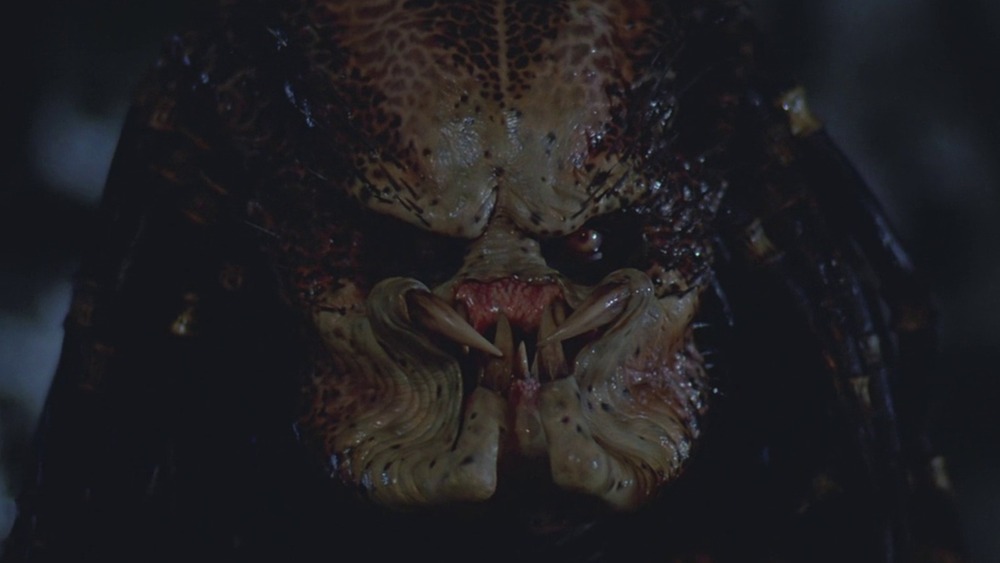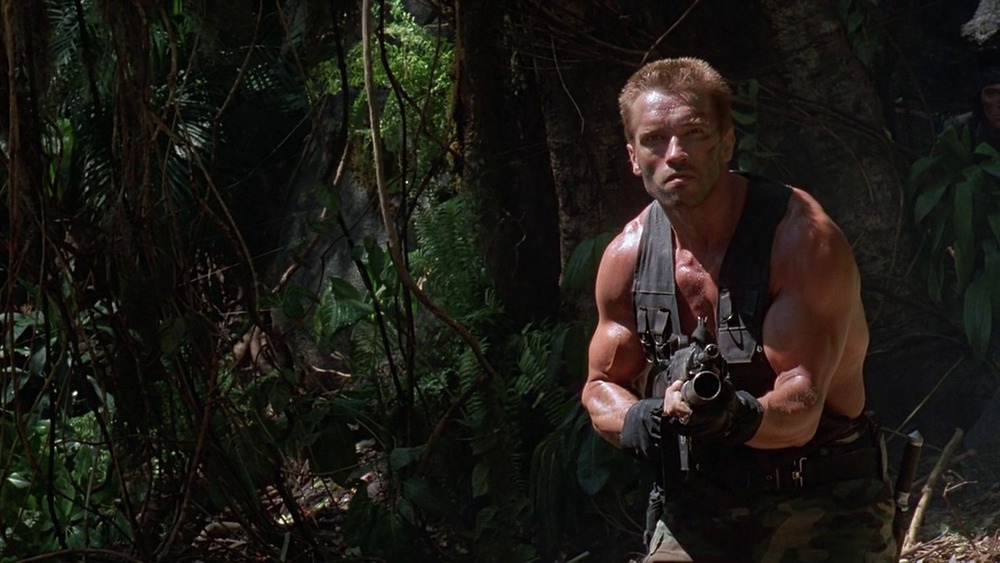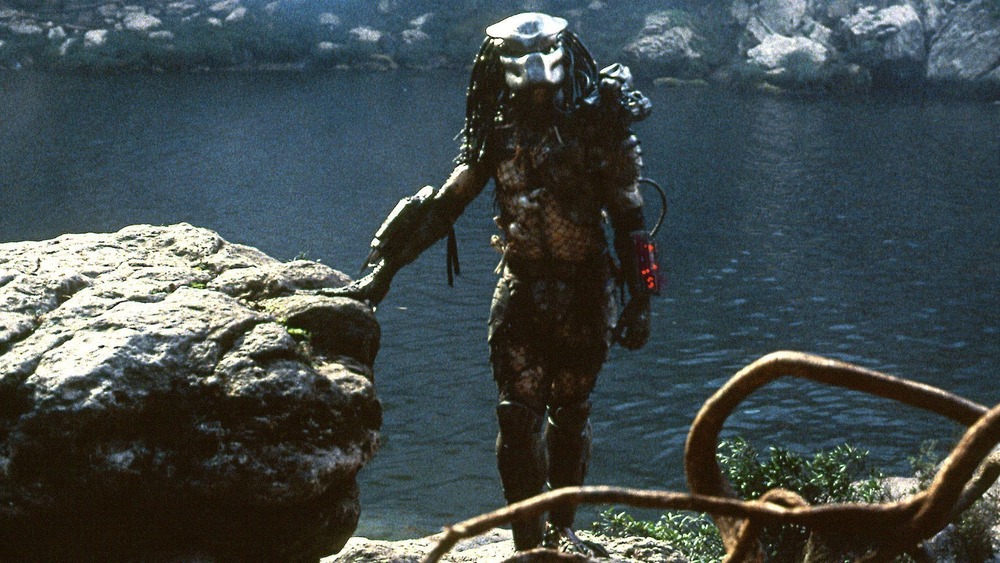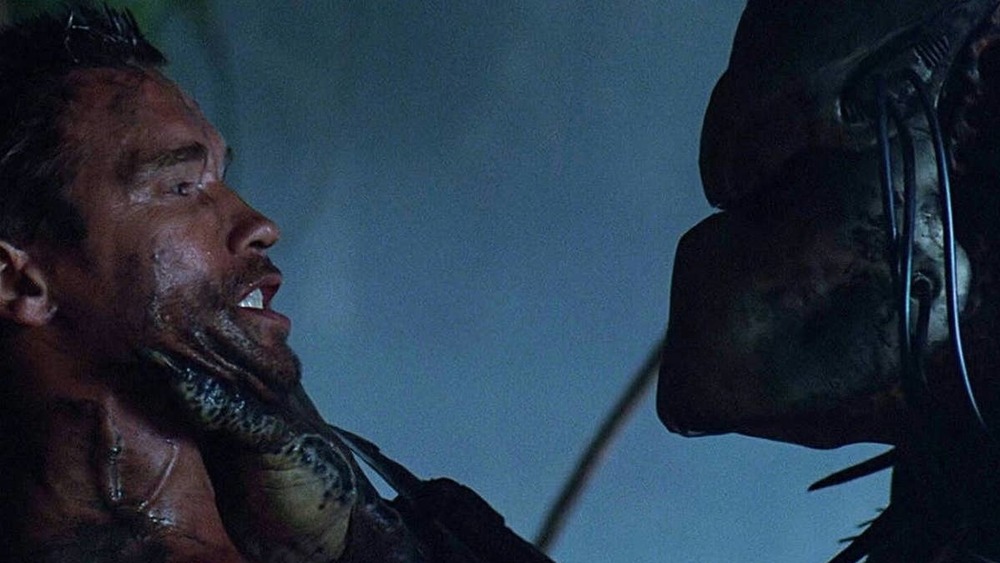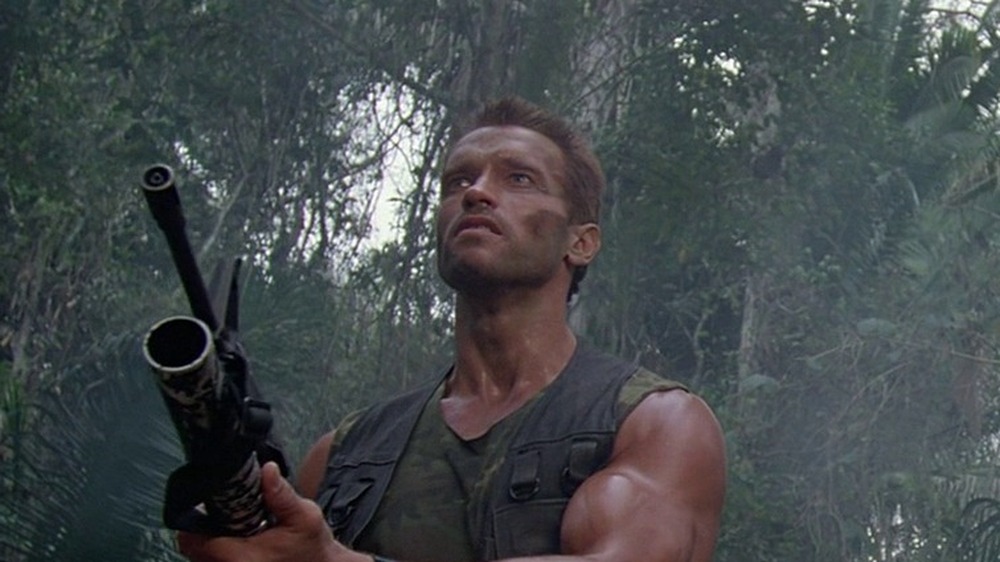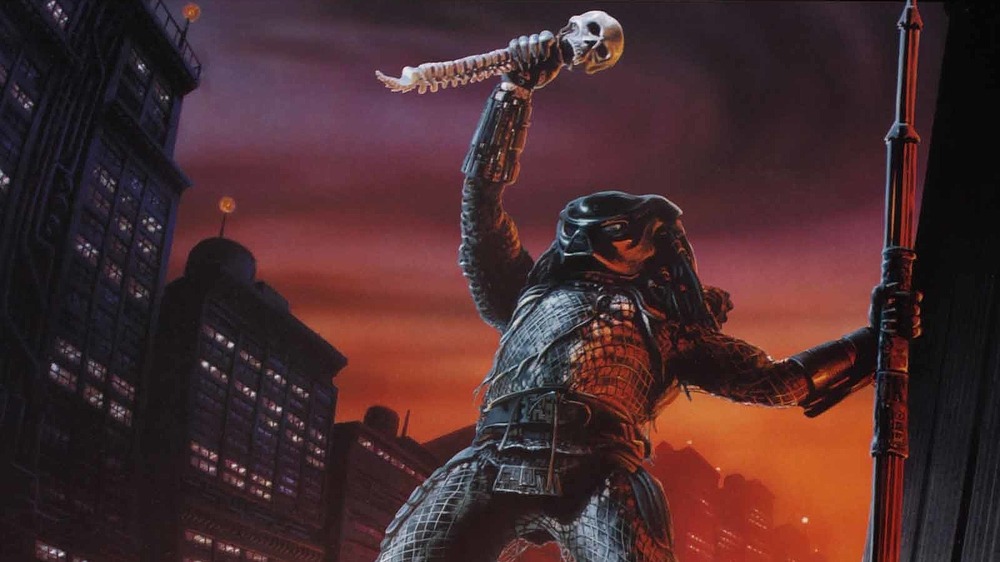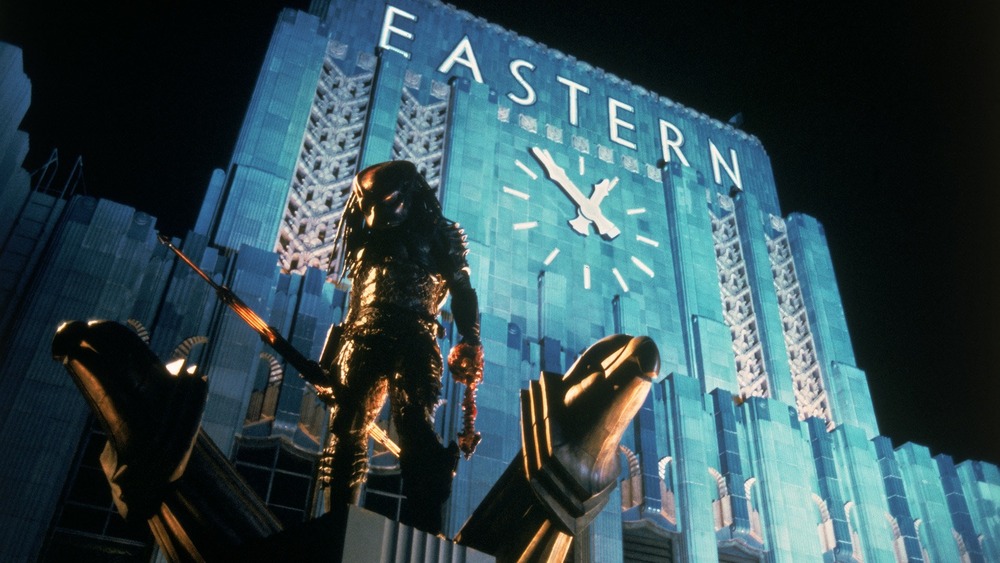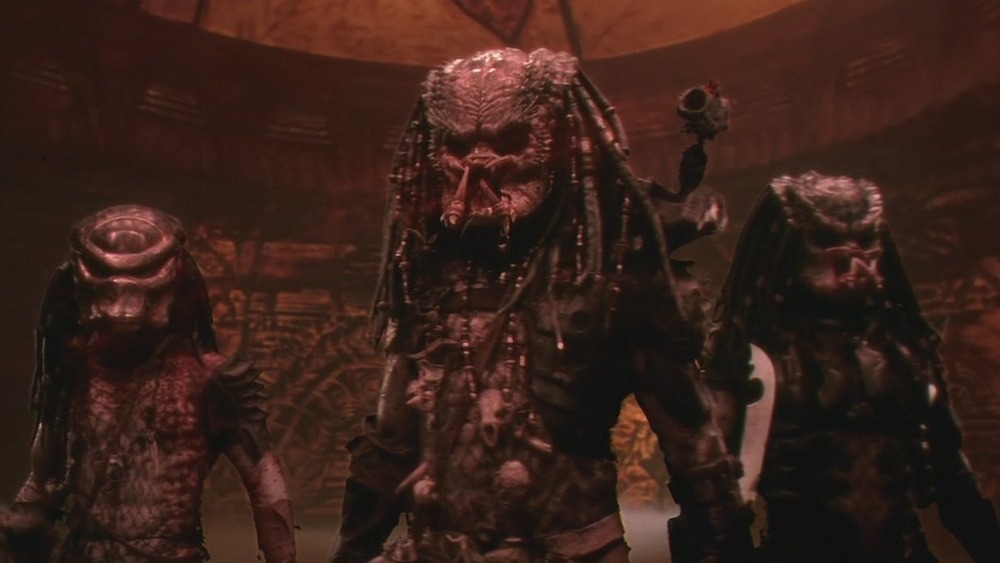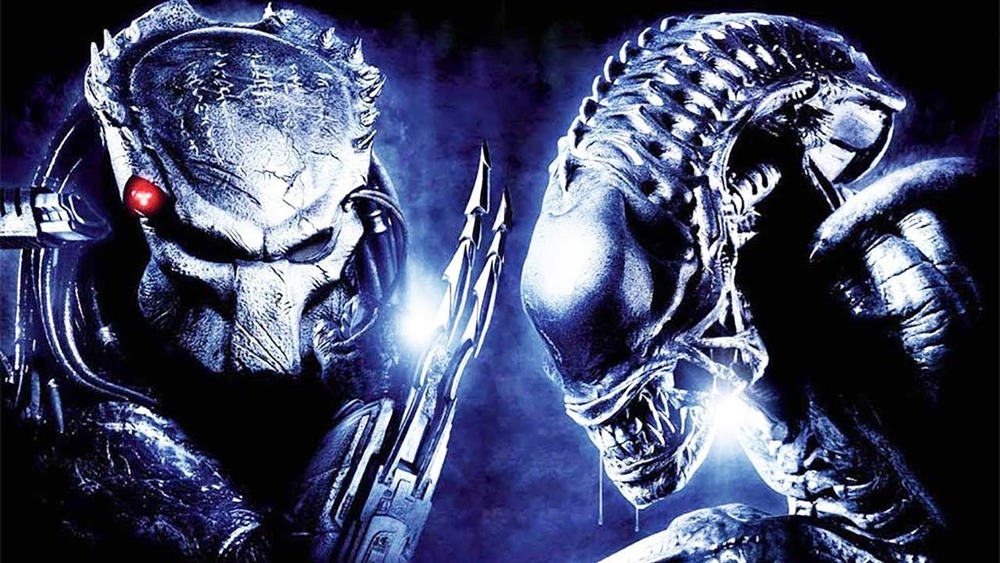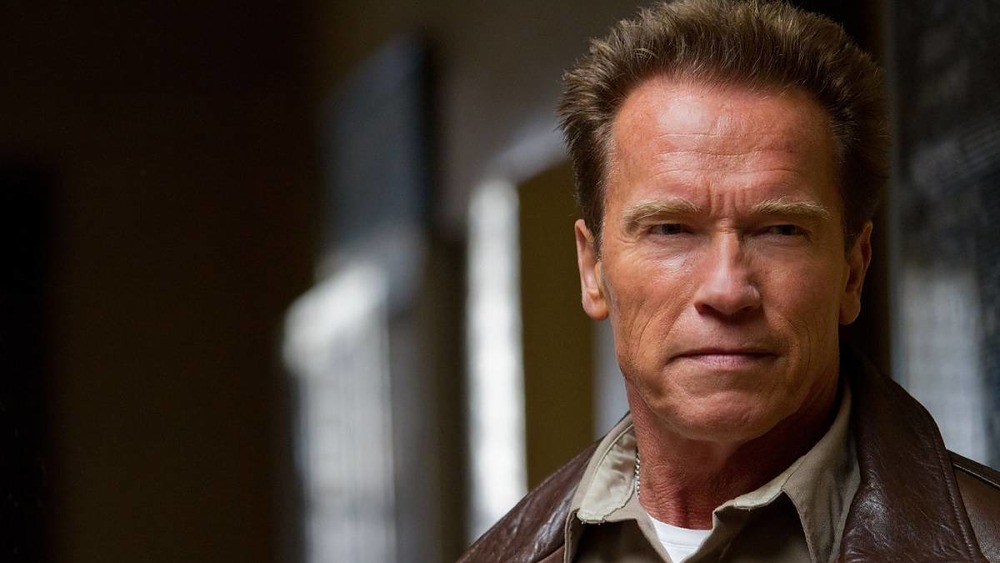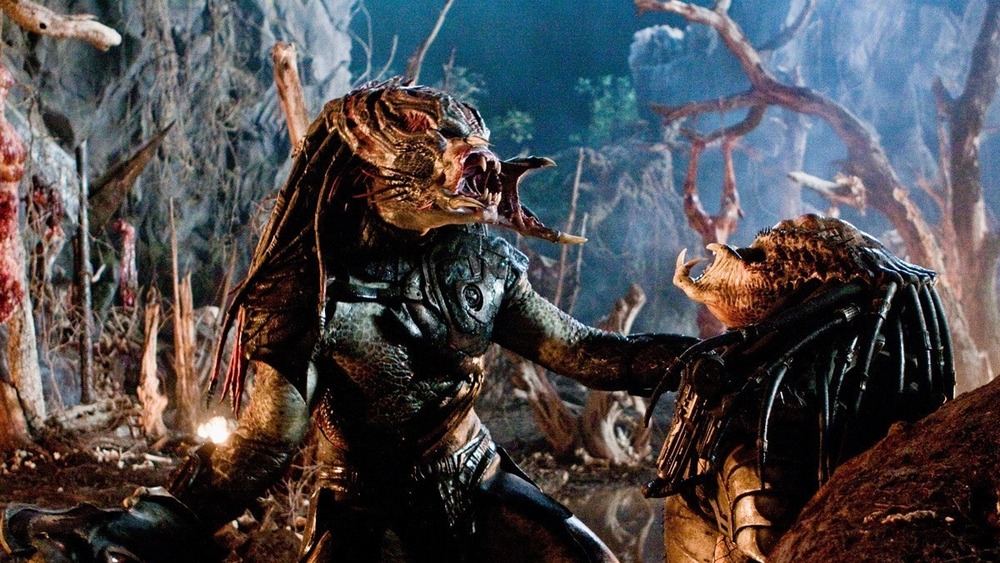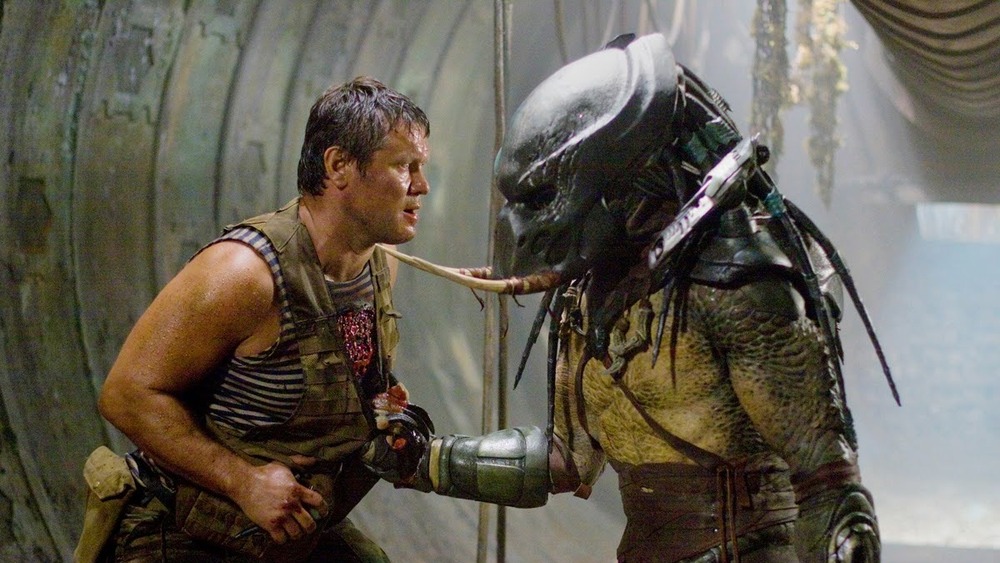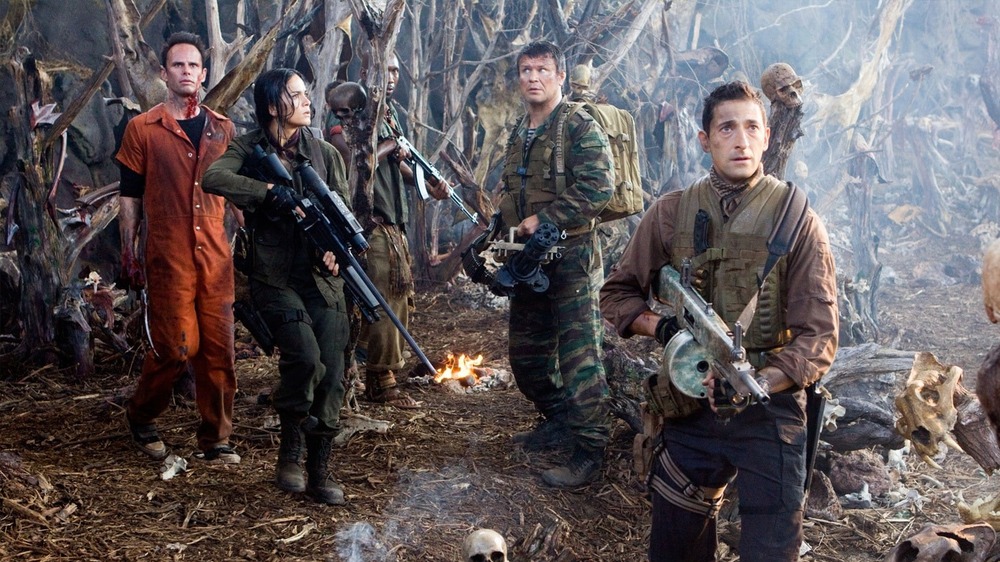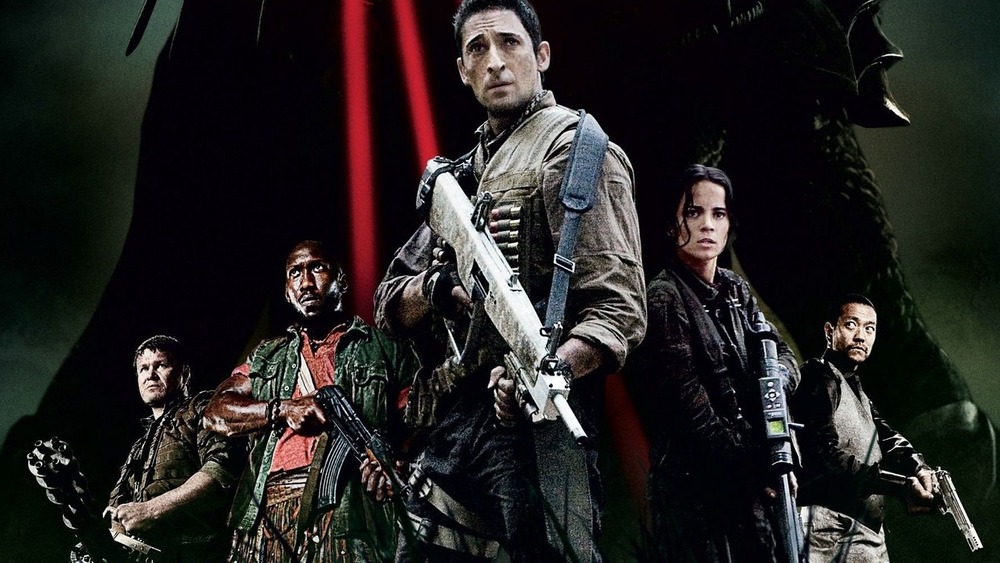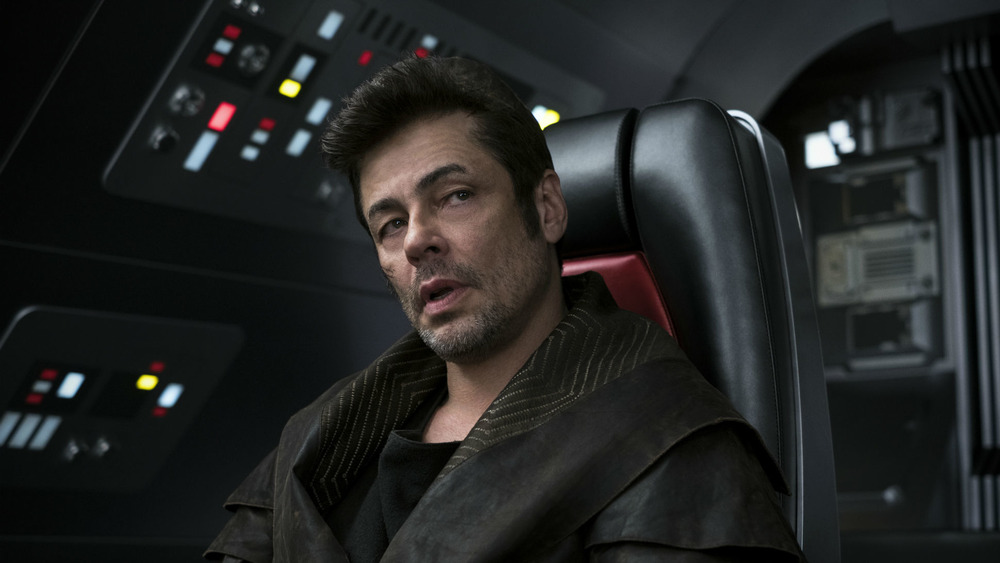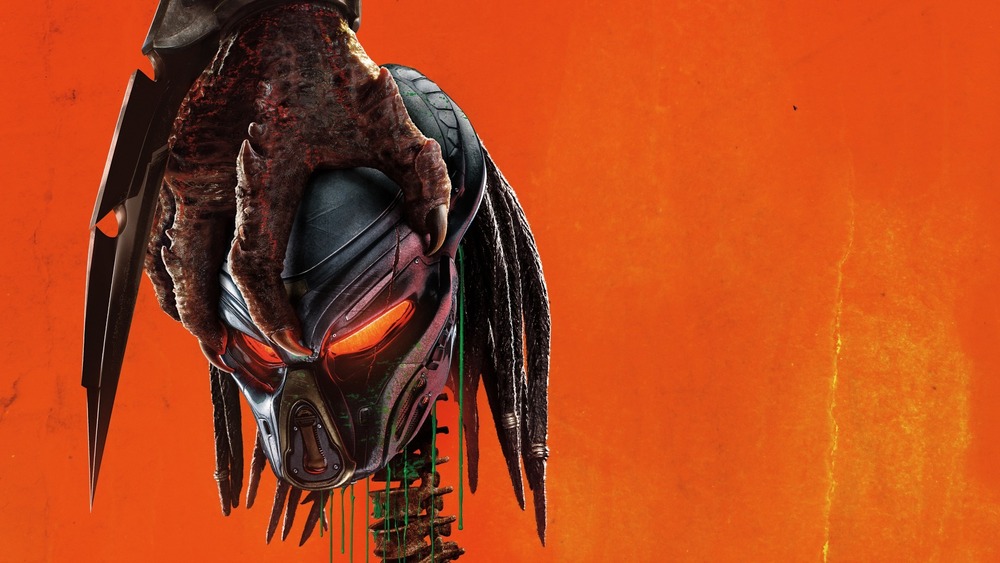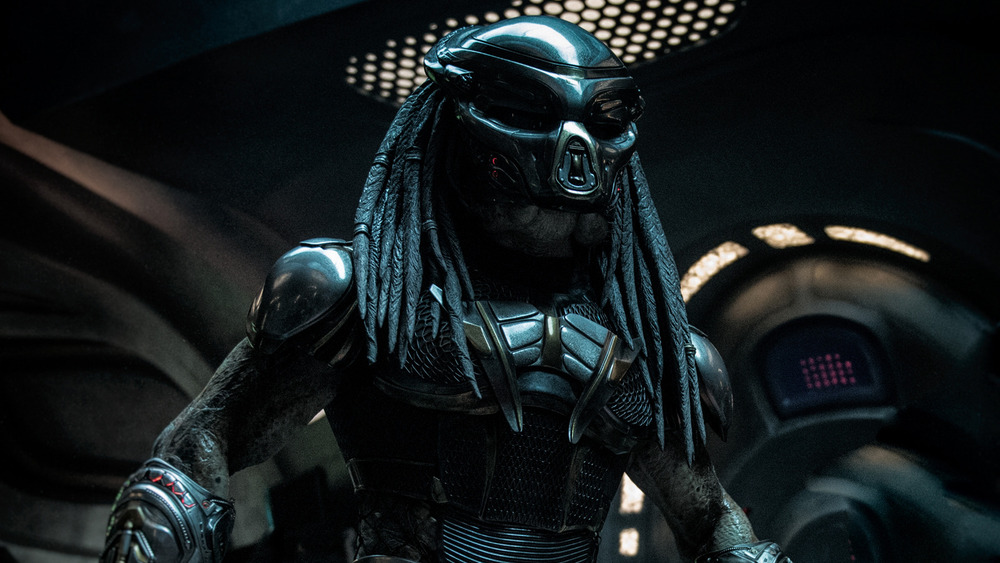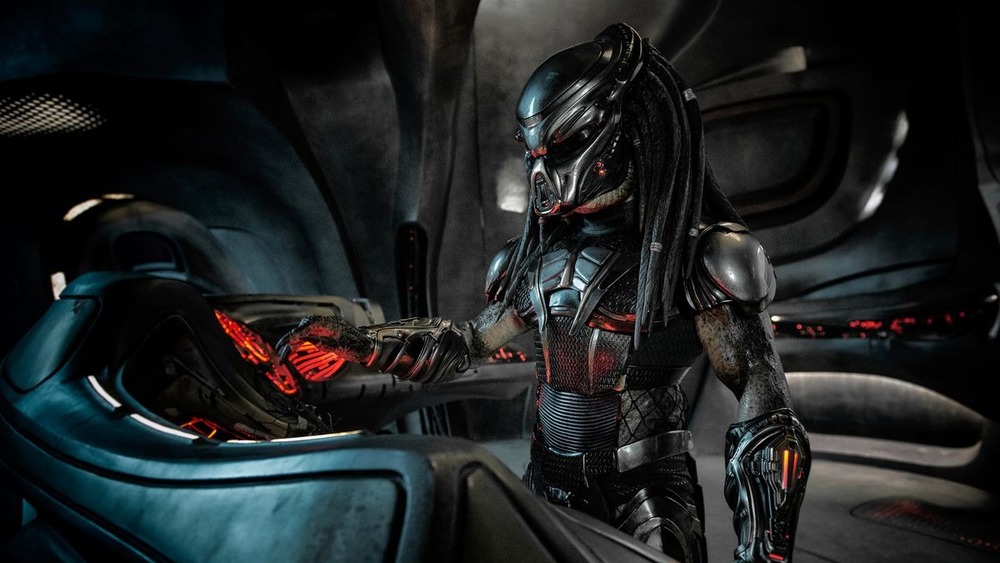The Untold Truth Of The Predator Film Series
In 1987, the world of movie aliens got changed forever once the Predator leaped onto the screen. This was not just another goofy man in a costume masquerading as an otherworldly visitor nor would this be just another disposable Arnold Schwarzenegger vehicle. The next-level visual effects, stunt work, and makeup wizardry used to bring the creature to life made the Predator seem like an actual living, breathing organism, and one that could quickly slaughter its prey to boot! Such a distinctive beast was never destined to be limited to just one movie. The Predator has gone on to headline six different movies, countless comic books, and numerous video games. It's safe to say that human beings have an unquenchable thirst for this killer alien.
But despite the fame of this franchise, there's still plenty of untold aspects of this saga's rich history. Some of these aspects relate to nifty behind-the-scenes details that reflect the complicated process of bringing one of these big-budget sci-fi movies to life. Other details relate to external forces that have shaped how these movies are perceived, for better and for worse. Wherever these elements came from, they all add up to the underdiscussed history of one of the most ubiquitous and game-changing aliens to ever grace the silver screen.
The first film's original title was Hunter
When a movie becomes iconic, it's difficult to imagine it going by any name other than its final title. It's hard to conceive, for instance, of Back to the Future carrying any of the other titles thrown around for that Robert Zemeckis movie, like Space Man from Pluto. The same is true of Predator, which started life as a script that carried a very different title to its name. Initially, the project was entitled Hunter, with Primevil and Alien Hunter also functioning as working titles for the endeavor. It was one of many differences between the first draft of Predator and the final product, which also extended to the appearance of the titular alien.
The name Hunter is a far cry from the film's final title. However, it does feel fitting enough for the motion picture to feel adjacent to Predator. After all, both titles are one-word creations that make it clear that the titular alien is looking to gruesomely take down the human characters. They also work in referring to either the aliens or the enduring humans. Eventually, though, the people behind this Arnold Schwarzenegger sci-fi feature opted to go in a different direction and changed the film's title to Predator. An unforgettable movie title was born, though the world was robbed of the chance of seeing future films entitled Hunters and The Hunter.
Predator's only gone to the Oscars once
It's hard to imagine the Predator movies having a heavy presence at the Academy Awards. This ceremony has long failed to recognize even artsier sci-fi storytelling. Movies like Predator, full of gore and spines being collected as trophies, aren't exactly up the alley of the voting body that found The King's Speech to be the best movie of 2010. Plus, not all entries in the franchise have been anywhere near critically acclaimed enough to warrant a trip to the Dolby Stadium, particularly dismally received entries like The Predator.
Thus, all the Predator movies have been excluded entirely from the Academy Awards ... except for one. The first Predator movie managed to achieve a feat as impressive as a human taking down a Predator warrior: scoring a Best Visual Effects nomination at the Oscars. This is a category where sci-fi fare and other genre movies have a better chance at getting recognized due to the kind of VFX wizardry needed to bring these stories to life. One of two nominees at the 60th Academy Awards, Predator ended up losing the Best Visual Effects trophy to Innerspace. Still, even getting the chance to show up at the ceremony was a major victory for the Predator franchise considering how other entries in the franchise like Alien vs. Predator: Requiem would be better suited for the Razzies.
Peter Cullen provided the Predator's clicking noise
Peter Cullen has done a number of famous roles as a voice actor, but his most prolific part came through voicing Optimus Prime in the 1980s Transformers cartoon. It's hard to think of this famous pop culture robot and not imagine Cullen's booming vocals. However, it turns out that Optimus Prime isn't the only iconic 1980s alien that utilized the pipes of Cullen. In fact, the Predator and its famous clicking noise also came from Cullen's work on the original Predator movie.
Cullen recounted the story of how he landed the gig in a 2018 comic convention appearance. He recalled how a bad experience with providing voicework for the 1976 King Kong remake initially put him off doing more monster movies. However, he went to audition for the part anyway and eventually got a chance to see the design of the Predator monster. The repulsive design of the beast intrigued him enough that Cullen put aside his own misgivings to help bring the Predator to life. In the process, he created an iconic clicking noise that could only emanate from a creature this disgusting. Much like how Cullen continues to provide the voice of Optimus Prime, Cullen's voicework for the Predator turned out to be so effective still utilized in the franchise to this day.
Arnold Schwarzenegger was supposed to return in Predator 2
In his career, Arnold Schwarzenegger hasn't regularly done sequels. He's done a number of Terminator movies, sure, but those are more of the exception than the norm. Throughout his career, Schwarzenegger's been more of a one-and-done kind of performer. Proposed follow-ups to The Legend of Conan and Twins have never materialized, while his other hit movies like Total Recall never spawned so much as murmurs of a follow-up. Schwarzenegger's Predator did inspire a slew of sequels, but they all went without him, despite initial plans for Predator 2 to include Schwarzenegger.
Producer John Davis said that the performer didn't return for the simple reason of money. "We should've had Arnold in the movie," Davis reflected to BANG Showbiz. "The deal broke down over $250,000, which is a shame. But it was moved from the jungle to the city. You have to create a freshness about it." In the end, plans for Schwarzenegger to go up for round two with those nasty Predators never came to be. Instead, Predator 2 got Danny Glover to keep up his cop-movie image by portraying a brand-new police officer protagonist. As for Schwarzenegger, his Predator character never returned to the series. Maybe if his deal for Predator 2 had more cents, Schwarzenegger would have made a rare foray into sequel territory.
The Predators can talk!
There are a lot of misconceptions about the Predator aliens. For one thing, their refusal to kill pregnant women and unarmed civilians show they do have limits as brutal hunters. An even more important misconception is that they're incapable of human speech. This is a more understandable misconception given that the Predator aliens have only communicated in clicking noises, evil laughs and otherworldly grunts throughout their various film appearances ... except for Predator 2.
This is established early on in the film as its main Predator antagonist overhears a human saying the F-word and proceeds to repeat it during the movie. However, the end of this installment proves that these creatures can do more than just parrot phrases they hear from Earthlings. Protagonist Mike Harrigan (Danny Glover), who just defeated the film's Predator nemesis, watches as other Predator aliens take their fallen comrade away. Before they all vanish off the planet, one of the Predators decides to recognizes this human's effectiveness in combat. Tossing Harrigan a pistol from 1775, the Predator then utters the words "take it!" It's one of several moments in this franchise that establishes these aliens as ruthless but also noble fighters.
Thanks to vocals provided by Hal Rayle, the Predators established their competence in the English language. They may not be as adept in it as they are with ripping out spines, but that moment alone should put to rest the notion that the Predators aren't capable of human speech.
Predator 2 initially scored an NC-17 rating
The Predator movies are violent. It's ingrained into the franchise's DNA. The titular aliens do not dispatch human beings in a non-messy manner. Unless you're watching Alien vs. Predator, there's gonna be blood, there's gonna be guts, and it's gonna be gruesome enough to warrant an R rating from the MPAA. One installment in the franchise, though, initially went even further than that by scoring an NC-17 rating.
Getting that rating dropped down to an R was not an easy task. Over 20 minutes of particularly gruesome footage related to the deaths of human characters at the hands of Predators was left on the cutting room floor in a bid to get Predator 2 a more marketing MPAA rating. Even with so many cuts, the MPAA apparently kept slapping the production with that dreaded NC-17 rating. In the end, all of that effort did manage to pay off as one of these alternate cuts of Predator 2 was finally given an R rating. In addition to ensuring that the film could play to a wider amount of audiences, this R also put Predator 2 it in line with the MPAA ratings of its predecessor and all but one of its follow-ups. It's a given that the Predator aliens will be excessively violent, but for one moment, it looked like Predator 2 would take that level of carnage to a whole new level.
Predator 2 has been criticized for being racist
Aliens have often been used for light-hearted means in cinema, like portraying cool designs or as a way to execute memorable death sequences for unlucky human beings. But they can also be used to reinforce racial prejudices that reflect both Hollywood and America's tendency to code creatures known as "the other" as people of color. An example of this phenomenon can even be found within one of the installments of the Predator franchise. Specifically, both the Predators and the human characters in Predator 2 have long been controversial for what many perceive as engaging in racist stereotypes.
In his review of the film, critic Roger Ebert noted that the Predators in Predator 2 are "a work of subtle racism." He went on to say, "Subliminal clues are slipped in to encourage us to subconsciously connect the menace with Black males." A retrospective review from Sam Shepards, though overall positive, noted that the Predators evoked shallow racial caricatures. Similar charges of racism could be levied against the film's portrayals of street gangs that are at war with each other before the Predators show up. Shepards in particular notes that, "Jamaicans are dangerous Black men with long dreadlocks who practice black magic and voodoo. Their intimidation rituals are very similar to the way the Predator 'hangs' his human trophies, which ends up perfectly camouflaging the actions of the extraterrestrial and also insulting Jamaicans in the process."
Alien vs. Predator didn't start out as a movie
Though it spawned two feature films, Alien vs. Predator didn't begin life as a motion picture. It actually started as a Dark Horse comic book series, one that ran from 1989 to 1990. Turns out, combining two exceedingly popular sci-fi franchises turned out to be a recipe for success. In fact, the story proved popular enough that Dark Hose eventually returned to this concept all throughout the 1990s. Alien vs. Predator even began to leap off into other mediums, such as a handful of 1990s video games. There was a demand for more material in this franchise, and that meant it was inevitable that this showdown would return to the medium where the creatures originated: cinema.
However, the eventual Alien vs. Predator films didn't have much to do with the original comics. Peter Briggs wrote an AvP screenplay in the early '90s that would have been based on these stories, but 20th Century Fox's eventual vision for this crossover would make use of its own original storyline. Though they may not have gotten directly adapted for the silver screen, the Alien vs. Predator comics can take credit for popularizing the idea of this otherworldly crossover.
Arnold Schwarzenegger almost returned for Alien vs. Predator
Each time a new Predator film comes up, so does the idea of Arnold Schwarzenegger reprising his role as Dutch. Predator 2 was supposed to feature the action star, but then payment issues prevented that. Decades later, Predators attempted to get an ending featuring the leading man of the first Predator, but it never came to be. Even The Predator tried once more to secure Schwarzenegger, only for the action star to turn down the feature due to his characters lack of screen time.
This tradition isn't exclusive to just solo Predator outings. It even came up with spin-off Alien vs. Predator, which apparently was able to not only talk to Schwarzenegger about showing up but also got him to officially sign on to the project. As director Paul W.S. Anderson recounted to Film Focus, Schwarzenegger agreed to appear in the film but only if they filmed in his house and if he lost out on being the governor of California. When the action star managed to secure a political victory, Alien vs. Predator's chances of securing a direct connection to past Predator adventures was gone. Though it didn't work out there, you can be sure Schwarzenegger will keep getting approached to return for future Predator movies.
All Predator movies have different directors
The Alien movies are Ridley Scott's baby. He hasn't directed all the installments in the series, but he birthed it with the original Alien and has since returned to the universe with Prometheus and Alien: Covenant. By contrast, the Predator series has evaded being associated with just one artist. John McTiernan directed the original Predator but never returned to the franchise afterward. Predator 2 would be helmed by Stephen Hopkins, in the process establishing a norm where each new Predator movie would be handled by a new filmmaker. Nimrod Antal and Shane Black would go on to helm subsequent solo Predator. Alien vs. Predator was directed Paul W. S. Anderson and Alien vs Predator: Requiem was helmed by the Brothers Strause.
There's never been an official reason for why each Predator movie has a different director, but one likely reason is simpl timing. Save for Predator 2 arriving three years after its predecessor, the Predator movies are not timely in their arrival, with 20 years passing between Predator 2 and Predators while another eight years separated Predators and The Predator. Within that timespan, filmmakers move, studio executives decide it's time for a new direction for the franchise and a new filmmaker gets brought onboard. With Dan Trachtenberg onboard to direct the next Predator adventure, the Predator franchise always welcoming new filmmakers will continue unabated.
Predators was written way back in 1994
Robert Rodriguez broke onto the Hollywood scene with his 1992 indie action movie El Mariachi. Rodriguez quickly became a hot commodity in Hollywood and scored a number of high-profile gigs. These included the script for a Predator follow-up, one that would take the action to the home planet of the Predator aliens. Though it would eventually be used as the basis for the 2010 feature Predators, it took decades for 20th Century Fox executives to see the value of the early screenplay from Rodriguez.
That screenplay came about through very humble origins. "Twentieth Century Fox just wanted a script that would entice Arnold back into the mix," Rodriguez explained to The Guardian. "I knew Arnold personally, and I knew he liked the first film's jungle setting, so I decided to write something with a jungle setting but set on another planet." The then-fresh-faced screenwriter go to work penning up a script, but it quickly became apparent that "it was completely undoable, especially back then." As he explained, "The CGI just wasn't available like it is today. So I turned it in and kinda forgot about it." While both Rodriguez and the Predator franchise moved onto other endeavors, their paths would end up intertwining once again. Years later, at the insistence of a new set of Fox executives, Rodriguez finally got his chance to see that script realized as a fully formed movie in Predators.
Predators initially discounted other Predator sequels
Since each new movie featuring the Predator has a new director, a new lead actor, and is even set in a new time period, it can be difficult to tell what's canon in this universe or not. The Predator answered that question explicitly with still photographs referencing the first two Predator adventures while featuring a spear from Alien vs. Predator. By contrast, the 2010 Predators movie wasn't looking to be as in inclusive with its own mythology.
While reporting on the Predators panel at South by Southwest, Cinema Blend confirmed that the film was looking to solely be a follow-up to the original 1987 Predator movie, with the other sequel and the two Alien vs. Predator movies discounted. It's an interesting reflection of where Hollywood's priorities were circa 2010, with Batman Begins and the recent Star Trek movie popularizing the trend of starting over fresh and ignoring prior movies in a long-running franchise. By contrast, the later film, The Predator, came about in the age of cinematic universes, where every movie, no matter how reviled, must be acknowledged. That certainly wasn't the intent of Predators, which tried to strip down the franchises mythology considerably by ignoring all prior installments.
There were plans for direct Predators sequels
It took Predators years to go from a script written in 1994 to a theatrically released movie in 2010. Once it got to the silver screen, though, nobody involved with Predators was willing to see its world lay dormant. The Predator franchise had already spawned three installments, so why couldn't it produce even more adventures — especially with Predators expanding the sagas mythology significantly? Just two weeks after Predators hit theaters, Robert Rodriguez confirmed that plans were in the works for a Predators follow-up, one that would take things in a more outlandish direction.
"[Twentieth Century Fox] really wanted it to be pretty contained, pretty scaled-back," Rodriguez said, according to IGN. "So we could see what the appetite was, because the bigger movie would actually be what comes following that. That kind of sets up a new storyline, new location and world, and then you can really go crazy from there." Despite the enthusiasm for more adventures with the Predators characters, those plans for follow-ups never came to fruition. Part of that is due to Predators doing fine but not exceptional at the box office, with a worldwide gross of $127.2 million. That's not the kind of box office that inspires multiple sequels. The franchise was eventually relaunched with a whole new cast and creative team with The Predator, though the Predator's otherworldly canine companions from Predators did reappear in that installment.
Benicio del Toro was originally set to star in The Predator
After early rumors that James Franco was being courted to take on the part, it was eventually revealed that Shane Black's The Predator had another star in mind to play its protagonist: Benicio del Toro. Fresh off his acclaimed turn in the movie Sicario, hiring del Toro would've marked the first time he and Black worked together. It also would have marked del Toro's latest foray into sci-fi acting following his supporting roles in Guardians of the Galaxy and Star Wars: The Last Jedi.
Despite all these promising ingredients, del Toro never appeared in The Predator. Shortly after news broke that he was in talks to be in the project, he dropped out of negotiations to appear in the film. The reason given for his departure was due to scheduling conflicts. In the wake of his departure, Boyd Holbrook, who had just appeared in the fellow 20th Century Fox sci-fi tentpole Logan, was selected to play the role originally meant for del Toro. While Holbrook has delivered his fair share of well-received roles, his presence isn't quite as intriguing as the idea of seeing del Toro face down some Predators.
Shane Black wanted to release an alternate cut of The Predator
The reshoots for Shane Black's The Predator were immense and drastically retooled the movie. Among the biggest changes was shifting the big third-act action set pieces from a daytime setting to a nighttime backdrop. As noted by Screen Rant, early leaked set photos revealed a climactic showdown between evil Predators and human characters teamed up with good Predators. That sequence never made it into the final cut, one of many scenes left on the cutting room floor.
So drastic were the changes that they appeared to take a toll on Black himself. In an interview with Collider, the director revealed that enough material was cut that it left him with a desire to put out a director's cut. Conceptually, it's a neat notion and one that could have allowed fans to see if the original version of The Predator was bad enough to warrant reshoots or one of many gutsy films torn down by overly-cautious studio executives. The idea never became a reality, though, with Black noting that The Predator's dismal box office resulted in 20th Century Fox having no interest in spending the money necessary to finish alternative versions.
The Predator was supposed to set up two sequels
Hollywood has always loved a good sequel, but the modern movie landscape practically demands not just sequels but cinematic universes. That's clearly what 20th Century Fox hoped for when it green-lit The Predator, a significantly more expansive foray into the Predator universe. Producer John Davis made those ambitions apparent while talking to Variety about how excited he was for Black's bold new take on the material. "This is an auteur-driven reimagining," Davis explained. "Shane Black has a voice and a signature, and it kind of re-enlivens the franchise." Davis also mentioned that the Predator was supposed to set up not just one but two sequels with the hope being that Shane Black could direct both subsequent installments.
Black expressed hesitation about getting ahead of himself, though he didn't rule out doing more Predator movies. "I would love to say we've been planning a trilogy, but I take one day at a time," Black remarked. "In motion-picture terms that's one movie at a time." Whatever the plans were for The Predator follow-ups, they never got to manifest thanks to the film's dismal box office haul. Grossing just $159.4 million worldwide, The Predator didn't make anywhere near enough to justify a sequel, let alone two of them.
The next Predator movie was meant to be a secret
When Disney bought 20th Century Fox, they made it no secret that they wanted to milk Fox properties for further sequels and spin-offs. That would inevitably have to include Predator, one of Fox's crown jewels. Even after the box office disappointment of The Predator, there was no way Disney would let the franchise rest. That inevitability came to pass in the fall of 2020, when it was revealed that 10 Cloverfield Lane director Dan Trachtenberg's upcoming project Stones was actually a new Predator movie in disguise. Considering the positive response to 10 Cloverfield Lane and the unique logline of the film (which would be set during the Civil War), response to this news was largely positive, though Trachtenberg himself had reservations about this leak.
Trachtenberg then took to Twitter to talk about the production, in the process revealing that this newest Predator movie was supposed to be a secret. "This was meant to be a surprise," Trachtenberg explained. "Been working on this for almost 4 years now. I am very sad that what we had in store for how you could discover this movie will no longer happen. It's a bummer. But also ... YAY!" While initial plans for how this new Predator movie would be unveiled got undercut, Trachtenberg did at least confirm that more Predator adventures were on the way to the delight of the franchise fanbase.
